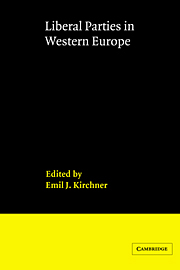Book contents
- Frontmatter
- Contents
- List of tables
- List of diagrams
- List of maps
- Notes on the contributors
- Preface
- 1 Introduction
- 2 Between left and right: the ambivalence of European liberalism
- 3 Two roads of Italian liberalism: the Partito Repubblicano Italiano (PRI) and the Partito Liberale Italiano (PLI)
- 4 The FDP in the Federal Republic of Germany: the requirements of survival and success
- 5 Great Britain — social liberalism reborn?
- 6 Liberalism in France
- 7 Liberal parties in the Netherlands
- 8 The Belgian liberal parties: economic radicals and social conservatives
- 9 The Freiheitliche Partei Österreichs: protest party or governing party?
- 10 The Swedish Liberal Party: The politics of unholy alliances
- 11 Liberalism in Denmark: agrarian, radical and still influential
- 12 The Norwegian Liberal Party: from political pioneer to political footnote
- 13 Liberal parties in Finland: from perennial coalition actors to an extra-parliamentary role
- 14 Liberal parties in Switzerland
- 15 The Luxemburg Liberal Party
- 16 Identifying liberal parties
- 17 Ambivalence revisited: an analysis of liberal party manifestos since 1945
- 18 Transnational links: the ELD and Liberal Party Group in the European Parliament
- 19 Western European liberal parties: developments since 1945 and prospects for the future
- Index of political parties
- General index
6 - Liberalism in France
Published online by Cambridge University Press: 16 November 2009
- Frontmatter
- Contents
- List of tables
- List of diagrams
- List of maps
- Notes on the contributors
- Preface
- 1 Introduction
- 2 Between left and right: the ambivalence of European liberalism
- 3 Two roads of Italian liberalism: the Partito Repubblicano Italiano (PRI) and the Partito Liberale Italiano (PLI)
- 4 The FDP in the Federal Republic of Germany: the requirements of survival and success
- 5 Great Britain — social liberalism reborn?
- 6 Liberalism in France
- 7 Liberal parties in the Netherlands
- 8 The Belgian liberal parties: economic radicals and social conservatives
- 9 The Freiheitliche Partei Österreichs: protest party or governing party?
- 10 The Swedish Liberal Party: The politics of unholy alliances
- 11 Liberalism in Denmark: agrarian, radical and still influential
- 12 The Norwegian Liberal Party: from political pioneer to political footnote
- 13 Liberal parties in Finland: from perennial coalition actors to an extra-parliamentary role
- 14 Liberal parties in Switzerland
- 15 The Luxemburg Liberal Party
- 16 Identifying liberal parties
- 17 Ambivalence revisited: an analysis of liberal party manifestos since 1945
- 18 Transnational links: the ELD and Liberal Party Group in the European Parliament
- 19 Western European liberal parties: developments since 1945 and prospects for the future
- Index of political parties
- General index
Summary
introduction
France has never had a great liberal party in the way that Canada or Great Britain have. Furthermore the word ‘liberal’ in France does not mean the same as it does in English. In France, its principal meaning is opposition to state intervention in economic or social life. For the French, Thatcherism is a kind of liberalism. In identifying liberalism in France, therefore, we shall not be looking for a great party with a long tradition but we shall be seeking to identify political forces belonging to Gordon Smith's ‘liberal-conservative’ classification rather than to a ‘liberal-radical’ one.
The chapter chooses to identify the UDF (Union pour la Démocratie Franchise), a federation of parties which were known as the Giscardiens when Valéry Giscard d'Estaing was president, as the political force that is best described as liberal. There are two reasons for this. One is that the Giscardiens have always used the word liberal in their appeal to the electorate and in their attempt to distinguish themselves from their coalition partners, the Gaullist RPR. The second is that Giscard d'Estaing as a political leader has been an authentic liberal in the English as well as the French sense of the word. In his speeches and writings before and during his presidency he has argued for tolerance, civil liberties, social reform, a less authoritarian and centralist style of government, and more recently for moins d'état – rolling back the state.
Choosing the Giscardiens as the French liberal party is nevertheless risky. First of all, they are not a party but a collection of three parties (plus several other smaller fragments).
- Type
- Chapter
- Information
- Liberal Parties in Western Europe , pp. 124 - 150Publisher: Cambridge University PressPrint publication year: 1988



